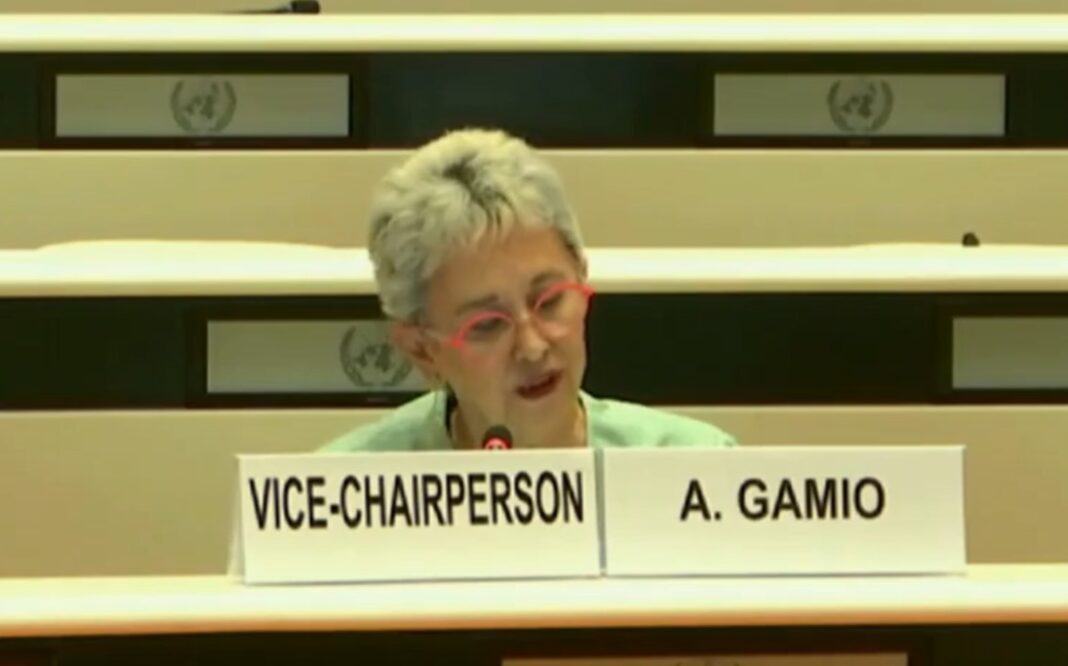In a moving speech delivered on 28 August at UN headquarters in Geneva, Dr Amalia Gamio, Vice-Chair of the Committee on the Rights of Persons with Disabilities, highlighted a worrying reality: the lack of implementation of deinstitutionalisation guidelines by member states.
Despite significant efforts by people with psychosocial and intellectual disabilities, their organisations, and various working groups, discrimination and human rights violations in institutions, specially psychiatric institutions, persist in the 21st century.
despite the adoption of these guidelines two years ago, virtually no state has taken concrete steps to implement them
Dr Amalia Gamio, Vice Chairperson of the UN Committee on the Rights of People with Disabilities
Dr Amalia Gamio stressed that, despite the adoption of these guidelines two years ago, virtually no state has taken concrete steps to implement them. In the reviews of state parties, it has been observed that measures contrary to articles 12, 14, 17 and 19 of the Convention on the Rights of Persons with Disabilities are wrongly justified as protection for persons with disabilities.
This approach ignores the guidelines of article 14 and general comment number 5 for article 19, which promote non-discrimination, respect for dignity, equality and deinstitutionalisation.
to persist in institutionalisation is to perpetuate the medical model that ignores gender, age and, above all, dignity.
Dr. Amalia Gamio, Vice Chairperson of the UN Committee on the Rights of People with Disabilities
Institutionalisation perpetuates an outdated medical model that ignores personal dignity and autonomy, increasing the potential for violence and limiting legal options for restorative action. And in fact as proven numerous times and again, the right to live independently and be included in the community implies living outside of residential institutions, a principle that continues to be ignored.
Dr Gamio emphasised that all international human rights treaties uphold the right to liberty and non-discrimination. Failure to implement the guidelines not only violates these rights, but also impedes the achievement of the Sustainable Development Goals, she stated, affecting poverty eradication, gender equality and inclusive economic growth.
The call is clear: there is no more time to lose. Society cannot continue to allow the rights of persons with psychosocial and intellectual disabilities to be violated. “Every year that passes without implementing these guidelines is another year of injustice and discrimination where people keeps being forced or even tricked into psychiatric facilities with a hope of helps that too often turns into betrayal” said one of the attendees at the UN. The international community must act urgently to ensure that the rights of persons with disabilities are fully realised.














 English
English French
French Spanish
Spanish German
German Dutch
Dutch Italian
Italian Danish
Danish Portuguese
Portuguese Greek
Greek Russian
Russian Swedish
Swedish Bulgarian
Bulgarian Hungarian
Hungarian Catalan
Catalan Ukrainian
Ukrainian Polish
Polish Basque
Basque Chinese (Simplified)
Chinese (Simplified) Japanese
Japanese Hebrew
Hebrew Arabic
Arabic Swahili
Swahili Amharic
Amharic Irish
Irish Afrikaans
Afrikaans Albanian
Albanian Armenian
Armenian Azerbaijani
Azerbaijani Belarusian
Belarusian Bengali
Bengali Bosnian
Bosnian Cebuano
Cebuano Chichewa
Chichewa Chinese (Traditional)
Chinese (Traditional) Corsican
Corsican Croatian
Croatian Czech
Czech Esperanto
Esperanto Estonian
Estonian Filipino
Filipino Finnish
Finnish Frisian
Frisian Galician
Galician Georgian
Georgian Gujarati
Gujarati Haitian Creole
Haitian Creole Hausa
Hausa Hawaiian
Hawaiian Hindi
Hindi Hmong
Hmong Icelandic
Icelandic Igbo
Igbo Indonesian
Indonesian Javanese
Javanese Kannada
Kannada Kazakh
Kazakh Khmer
Khmer Korean
Korean Kurdish (Kurmanji)
Kurdish (Kurmanji) Kyrgyz
Kyrgyz Lao
Lao Latin
Latin Latvian
Latvian Lithuanian
Lithuanian Luxembourgish
Luxembourgish Macedonian
Macedonian Malagasy
Malagasy Malay
Malay Malayalam
Malayalam Maltese
Maltese Maori
Maori Marathi
Marathi Mongolian
Mongolian Myanmar (Burmese)
Myanmar (Burmese) Nepali
Nepali Norwegian
Norwegian Pashto
Pashto Persian
Persian Punjabi
Punjabi Romanian
Romanian Samoan
Samoan Scottish Gaelic
Scottish Gaelic Serbian
Serbian Sesotho
Sesotho Shona
Shona Sindhi
Sindhi Sinhala
Sinhala Slovak
Slovak Slovenian
Slovenian Somali
Somali Sundanese
Sundanese Tajik
Tajik Tamil
Tamil Telugu
Telugu Thai
Thai Turkish
Turkish Urdu
Urdu Uzbek
Uzbek Vietnamese
Vietnamese Welsh
Welsh Xhosa
Xhosa Yiddish
Yiddish Yoruba
Yoruba Zulu
Zulu